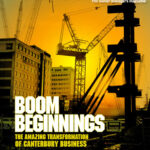Chasing the vision: the truth about business start-ups
Nothing compares to the thrill of launching your own business; taking a product or service to market; knowing that your future’s entirely in your hands.
But how quickly that dream can come crashing down through mistakes, obstacles, lack of skills or simply running out of cash.
1.1K
Nothing compares to the thrill of launching your own business; taking a product or service to market; knowing that your future’s entirely in your hands.
But how quickly that dream can come crashing down through mistakes, obstacles, lack of skills or simply running out of cash.
This guide to starting a business offers an early reality check, plus advice to ensure you never get ‘stuck in start-up’.
It’s true that Kiwis take to business ownership like ducks to water. The whole idea of starting and growing a business appeals to our DIY go-it-alone attitude. Every year thousands of companies are registered, websites launched, doors opened, and dreams unleashed.
Furthermore, according to the 2012 World Bank survey New Zealand is ranked as the easiest place in the world to start a business, and we’re third only to Singapore and Hong Kong for ease of doing business. There are few restrictions on establishing, owning and operating a business in this country; the process of starting a business can take just three days.
No wonder we’re all doing it. Problem is, many of us are not doing it very well. For a start, we simply may not be cut out for it. After all, who wants to earn a pittance for the first few years, put relationships on the back-burner and endure such mental and emotional strain?
NZBusiness asked a number of business owners what they think it takes to be one. The truth is it’s one of the hardest things you’ll ever do. The following comments from entrepreneurs at Massey University’s ‘start-up hub’ ecentre bear this out.
“Be prepared to be knocked back and put into uncomfortable situations,” says Olivia Willard of littleblackfrock.com. “If you find it hard to pick up a phone or knock on an unknown door then running your own business is not for you. It is easier to critique than to create and therefore you’ll receive a lot of feedback from other people about your approach and your business. You need to be optimistic and believe in your idea but also a realist and quick decision maker.
“Overall you must be tenacious and not afraid of failure.”
Aaron Povey from Maddazz Trikes believes to succeed in business it helps if you’re a ‘people person’ and, most importantly, have a dedication and passion for your product or service. “You’ll require drive, commitment and an understanding and/or committed partner or spouse,” he says.
“Before you make the commitment, ask yourself not just if the rewards if the business succeeds will be worth it, but if the experience gained if it fails will also be worth it. Can you afford financially to fail?”
Storkk’s Brad Booysen says business owners must be flexible. “Rigidity is an entrepreneur’s worst enemy. The chances of your first idea being right are incredibly slim, so expect to change tack, sometimes multiple times, till you find your product/market fit.
“Many entrepreneurs get paralysed by indecision because they are scared of making the wrong decision. Your new business requires you to make decisions quickly. It’s much easier to ‘course correct’ than it is to miss a potential opportunity.”
Ecentre mentor Heath Milligan sums up the necessary characteristics of a successful business owner in five words: optimism, gumption, psychological resilience (it will get tough as some point) and caring (about customers and staff). “The key question to ask is ‘Can I stick to this and follow through for at least two years; to allow myself enough runway (in terms of time, energy and finance) to make this start-up a viable, successful business?’”
Entrepreneurs and founders of start-ups usually have a unique perspective of a problem and an idea that will potentially solve it – a hypothesis for a potential solution – suggests Louis Gordon-Latty, CEO of GloryLeague Sports.
“The founder, or founding team, should have a broad range of attributes or be able to quickly fill any holes in the team.” He says ideally a founder needs some of the following: domain expertise, resilience, creativity, engineering/build skills, passion for the problem, determination, and, most importantly, an ability to sell. It’s also about the ‘problem-person fit’. Does the business and the problem it’s solving [for customers] resonate? “Would you be happy to work in a business that solves this kind of problem for five, ten years, or more?”
Of course, many start-ups falter because the owner lacks the management skills to move the business forward. So how do you overcome this?
Greg Murphy, platform partner manager for Unleashed Software says it’s important to admit you don’t know everything. “Be honest about your weaknesses but hold confidence in what you know you are good at, as confidence is everything. Once you can see the gaps in your skill set versus business requirements, start networking. Channels like LinkedIn, business advisors, universities or facilities like the ecentre are a good start.
“Find people who believe in you, get their advice and take it. Find a mentor and meet regularly. If you can, pay a set of advisors to meet with, who have been in your space before. Also, research and learn business skills through books, forums and Google. Plan to not know stuff and build a network of smart people to lean on. In my experience, your network is key to breaking out of start-up,” he says.
Is this the right time?
Start-up entrepreneurs are eternal optimists, according to Tony Falkenstein, communications chair of Entrepreneurs’ Organisation NZ and director of Just Water International. So they’re not particularly concerned about the local or international economic situation when they launch a company.
“While they may remain optimistic, the reality is that a country’s economic situation impacts hugely on start-ups. If it’s tough for established businesses, it is doubly hard for start-ups, because they have no existing business or revenue to fall back on.”
So is timing a factor when starting a business?
“It really depends on the business,” says Falkenstein. “I started my business, Red Eagle, as a fax rental business a week after the 1987 sharemarket crash. That timing proved to be opportune, as businesses tended to put capital purchase decisions up the chain of command, yet a much lesser person in the chain could approve a rental. So, the start-up flourished because nobody else was focused on the renting of fax machines.
“The big question a start-up business owner has to ask themselves is why would somebody buy their product over someone else’s. If there is no difference in the offering, then no time is a good time to start the business.”
A lack of cash is generally the biggest hindrance to a business getting out of the starting blocks.
“They run out of cash either from being too successful (cash tied up in debtors and stock) or not successful enough, and costs have got ahead of revenue,” says Falkenstein. “In order to accelerate growth, the start-up has to be sure of its cashflow.”
One of the challenges the new breed of entrepreneurs have is that they “fall in love with their spreadsheets. They think the bottom line a year out will be exactly what is portrayed in their forecasts,” says Falkenstein. “Generally it doesn’t work out that way. The costs end up higher, and the revenue lower. They need to be prepared for this and focus on what is actually happening rather than their spreadsheets and forecasts.”
Falkenstein’s “best advice” for start-ups is to stop and think before launching head first into creating a business. “Many people want to create the next ‘big’ business but not many really think about why the idea is unique. They need to come to me with questions already answered – questions like: Why am I creating this business? Who am I selling to? Why do they want what I’m selling?
“They also need sustainable resources to get the project off the ground.”
Raising cash; power in numbers
When you’re a new business starting out funding, options can be somewhat limited – especially once you get past family and friends, the bank (mortgage on your house) and any angel investors who may have taken a shine to your offering.
Equity crowdfunding, the latest means to raising seed and growth capital, has got a lot of people excited, but it does come with potential traps.
Steve Corbett, ecentre CEO and founder, sees it as a viable method for capital raising “but you need to be comfortable with, and able to manage, shareholders whom you’ve probably never met.
“Non equity crowdfunding is probably a safer first step, and can be effective as product validation.”
Josh Daniell, business development manager for equity crowdfunding platform Snowball Effect, believes equity crowdfunding will improve access to finance for new companies and enable everyday Kiwis to access high growth investment opportunities.
“Until now, it’s been very expensive and time-consuming for a company to offer shares to the public. The time and cost was prohibitive for most Kiwi companies, so they were restricted to investors that were close friends and family, financial institutions, angel investors and individuals who could prove they are sophisticated or habitual investors.
“The Financial Markets Conduct Act 2013 and corresponding Regulations provide a new channel for investors. Through licensed equity crowdfunding platforms, each Kiwi company can raise up to $2 million in any 12-month period by offering shares to the general public.”
This enables businesses to raise funds from their most passionate supporters, customers and users, he says. “This is where the funds typically come from in crowdfunding.”
Daniell says the response so far has been “huge”.
“Holes within the funding ecosystem for smaller Kiwi companies are widely acknowledged and everyone is keen to see the SME sector flourishing. Equity crowdfunding will help to fill those holes and fund the growth of Kiwi businesses and the wider economy.”
Snowball Effect is itself a start-up. So NZBusiness asked Daniell what steps they’ve taken to ensure their own long term success.
“Aside from the usual factors such as market validation, ample funding and proper planning, the key thing has been to develop a quality team that is aligned to the same vision – we all want to leave a lasting benefit on the New Zealand economy,” he says. “That vision motivates us to succeed in a way that pure financial incentives cannot.”
Oliver McDermott, managing director of North Shore-based Blender Design, has utilised online non-equity crowdfunding platforms in the past and is excited about the potential for equity crowdfunding to raise the barriers to early funding.
“Essentially crowdfunding allows entrepreneurs to focus on their business and product and not raising capital; this is ideal.
“Equity crowdfunding also benefits the investors, making it far easier for them to invest in a portfolio of start-ups, spreading their risk, without all the red tape usually associated,” he adds.
“It also allows ‘Joe Bloggs’ to invest in some very cool new ideas at their seed stage. For me this is far more interesting than investing in listed companies; however it does pose more risk.”
The power of the crowd is also a big plus, he says, which people don’t often think about.
“When you have a large group of backers all with skin in the game you effectively have a very good web of influence who’re out there tweeting etc, and promoting your brand.
“My favourite thing of all, it that your backers become a very valid and powerful advisory board, helping you make important decisions. Simply put, it is power in numbers.”
Tech start-ups
New Zealand’s technology sector arguably stands to gain the most from the new equity crowdfunding laws. Greg Shanahan, founder of the Technology Investment Network (TIN), which produces the TIN 100 report/ranking, is an authority and expert on anything to do with New Zealand’s technology sector. He says there are real gaps in early stage funding where there is significant technology risk – that is, the solution may or may not work and significant investment is required to find out. “This may be an opportunity where crowdfunding could help.”
His advice for tech start-ups is to get the right people on board, with the right mix of talents who can work together well. “That’s easier with people you know. Choose talented people with a sense of urgency and a bias for action. Have a clear sense of what your point of difference is for the customers you are targeting. And get revenue at the earliest opportunity.”
Revenue solves a lot of problems, he says, however, sometimes companies put too much effort and focus into raising capital instead of finding paying customers.
“Talk to as many people as you can to get a sense of the issues. And lastly keep going!
“I think start-ups must have urgency and clarity to survive. Most of the failures in early stage companies that I have seen are around people.”
Shanahan says one of the most surprising statistics that’s come out of New Zealand’s tech sector is the fact that access to capital is the lowest ranked issue affecting business, as rated by TIN100’s CEOs. “I believe the lesson here is that CEOs focus on the things they can influence.”
Some tech standouts for Shanahan include GreenButton (cloud solutions for compute-intensive applications), Flintfox (trade promotions software) and Dunedin designer fireplace manufacturer Escea; but he points out that there are few overnight successes. “People forget that Xero’s been going eight years.”
So what do the successful tech start-ups have in common?
“Increasingly our best companies have a leadership position in their respective markets. This enables them to be a price maker rather that a price taker – thereby protecting their gross margin,” he says. “They are also quick to respond to market conditions in managing their cost structure.”
Protecting gross margins whilst maximising growth is a tricky balance, he says.
“Generating recurring revenue has proven to be an important part of this mix, be it software-as-a-service or medical consumables. Cloud-based software-as-a-service has huge potential for our software industry in terms or reducing the cost of customer acquisition and enabling global distribution.”
His lessons for tech start-ups include:
• Lead in your respective market through a unique position.
• Understand the market and your point of difference.
• Have a vision for where you want to be. How about global domination?
• Execute well. Ideas are cheap.
• Ensure you have a sustainable profitable business model and cost structure. What opportunities exist for recurring revenue with your customers?
• Stay focused. Measure your performance to keep on track.
• Move quickly. Technology opportunity windows can be fleeting.



